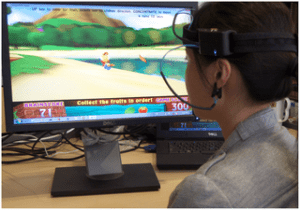Study: Emerging brain computer interface can monitor and train attention in unmedicated ADHD children
 Training program improved inattentive symptoms in children with ADHD (Healio Pediatrics):
Training program improved inattentive symptoms in children with ADHD (Healio Pediatrics):
“An 8‑week intervention with a brain-computer interface-based attention training program significantly improved inattentive symptoms associated with attention-deficit/hyperactivity disorder in children aged 6 to 12 years, according to recent study results…“In our first study, we found that intervention with a training program involving the [brain-computer interface]-based attention training game system improved parent-reported inattentive symptoms,” Lim and colleagues said…“Since then, we have developed a new version of the device that is simple, uses dry EEG electrodes and is connected by Bluetooth to the computer. A new game that could be calibrated based on the performance of the child was also developed. In addition, it was important to understand who would be the right candidates to benefit from this approach.”
Study: A Brain-Computer Interface Based Attention Training Program for Treating Attention Deficit Hyperactivity Disorder (PLOS ONE)
- Abstract: Attention deficit hyperactivity disorder (ADHD) symptoms can be difficult to treat. We previously reported that a 20-session brain-computer interface (BCI) attention training programme improved ADHD symptoms. Here, we investigated a new more intensive BCI-based attention training game system on 20 unmedicated ADHD children (16 males, 4 females) with significant inattentive symptoms (combined and inattentive ADHD subtypes). This new system monitored attention through a head band with dry EEG sensors, which was used to drive a feed forward game. The system was calibrated for each user by measuring the EEG parameters during a Stroop task. Treatment consisted of an 8‑week training comprising 24 sessions followed by 3 once-monthly booster training sessions. Following intervention, both parent-rated inattentive and hyperactive-impulsive symptoms on the ADHD Rating Scale showed significant improvement…
- Conclusion: Brain computer interface based attention training game can be a potential new treatment for ADHD. A randomized controlled trial to study the efficacy of this intervention and the neural mechanisms underlying the behavioral improvements is currently underway. It represents a novel treatment modality for ADHD, which not only has the potential for being used in combination with present evidence-based treatment, but also uniquely in a non-clinical setting.
To Learn More:
- Biofeedback now a “Level 1 — Best Support” Intervention for Attention &Hyperactivity Behaviors
- New Review of Neurofeedback Treatment for ADHD — Current State of the Science
- Adaptive Working Memory Training Can Reduce ADHD-related Off-Task Behavior
- New Study shows Teens with ADHD helped by Cognitive Behavioral Therapy


